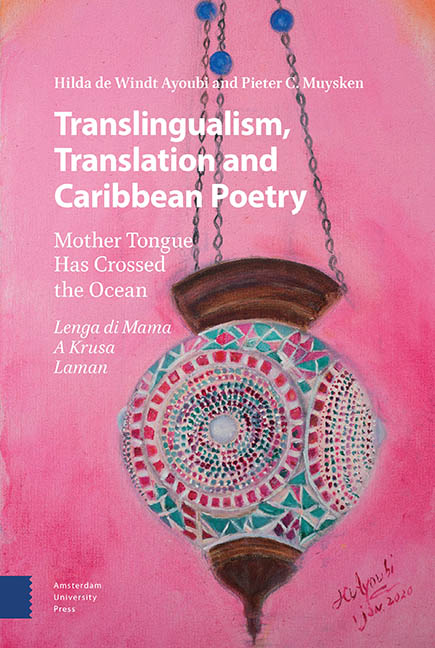Book contents
- Frontmatter
- Dedication
- Contents
- How to Navigate This Book: Kon Nabegá den e Buki akí
- Acknowledgements
- Preface
- Part 1 Introducing the Mother Tongue: Introdukshon di Lenga di Mama
- Part 2 The Poem “Lenga di Mama” and its Translations, Comments and Language Descriptions E Poema “Lenga di Mama” i su Tradukshonnan i Komentario i Deskripshon di e Idiomanan
- Part 3 The Poem “E ‘papiá’ di Papiamentu” and its Translations E Poema “E ‘papiá’ di Papiamentu” i su Tradukshonnan
- Part 4 The Poem “Papiamentu pa Semper” and its Translations E Poema “Papiamentu pa Semper” i su Tradukshonnan: The Translations and Editing of the Poem Hilda de Windt Ayoubi and Pieter Muysken (for Dutch)
- Part 5 The Poem “Riba Ala di Lenga di Mama” and its Translations E Poema “Riba Ala di Lenga di Mama” i su Tradukshonnan
- Part 6 Commentary: Komentario
- Note on the Authors: Informashon tokante e Outornan
- Index: Índise
Other Languages of Europe: Otro idiomanan diEuropa
Published online by Cambridge University Press: 15 September 2022
- Frontmatter
- Dedication
- Contents
- How to Navigate This Book: Kon Nabegá den e Buki akí
- Acknowledgements
- Preface
- Part 1 Introducing the Mother Tongue: Introdukshon di Lenga di Mama
- Part 2 The Poem “Lenga di Mama” and its Translations, Comments and Language Descriptions E Poema “Lenga di Mama” i su Tradukshonnan i Komentario i Deskripshon di e Idiomanan
- Part 3 The Poem “E ‘papiá’ di Papiamentu” and its Translations E Poema “E ‘papiá’ di Papiamentu” i su Tradukshonnan
- Part 4 The Poem “Papiamentu pa Semper” and its Translations E Poema “Papiamentu pa Semper” i su Tradukshonnan: The Translations and Editing of the Poem Hilda de Windt Ayoubi and Pieter Muysken (for Dutch)
- Part 5 The Poem “Riba Ala di Lenga di Mama” and its Translations E Poema “Riba Ala di Lenga di Mama” i su Tradukshonnan
- Part 6 Commentary: Komentario
- Note on the Authors: Informashon tokante e Outornan
- Index: Índise
Summary
Abstract
While many languages of Europe belong to theIndo-European family, there are two other familiesrepresented on the continent (in addition to theSemitic language Maltese spoken in the Republic ofMalta): Finno-Ugric or Uralic and Basque. Thissection presents translations into theseadditional European language families.
Keywords: Folk Poetry, Literature,Ergative Language, Bilingual
The Finno-Ugric or Uralic family is presented in thisbook by Eesti Keel or Estonian, alanguage related to Finnish, spoken primarily in theRepublic of Estonia, where it is the officiallanguage. It has over 1,000,000 speakers. The firsttexts in Estonian date back to the sixteenthcentury; in earlier times German was used, alanguage from which Estonian borrowed many words.More recently, Russian became dominant and therestill is a Russianspeaking minority in Estonia. LikeFinnish, the language has a very rich case system,with fourteen case endings for each noun. Thus, “Putthe glass on the table” becomes Pane klaas lauale, and “Itook the glass from the table” Mavõtsin klaasi laualt. Theadjective generally agrees with the noun in case.From the sixteenth century onwards, there has beenwritten literature in Estonian, much of which tookthe form of folk poetry and later on also folksongs. Modern Estonian literature covers severalgenres.
Euskera or Basque is the well-knownlanguage of Basque country in part of northern Spainand southwestern France. It is not related to theother European languages, and there has beenconsiderable speculation about possible relatives ofthe language outside of Europe but without muchsuccess. Despite being declared as dying already inthe nineteenth century, it has survived andcurrently has around 700,000 speakers. In additionto the standard language, Euskera Batua, there arefive regional dialects. Euskera has undergoneinfluences from surrounding Spanish and Frenchvarieties, but it also may have influenced Spanishin the past. Basque is an ergative language, whichmeans that the subject of a transitive verb receivesa special marking, as in the following example:Ni-k liberu bateresten dut “I buy the book”.
- Type
- Chapter
- Information
- Translingualism, Translation and Caribbean PoetryMother Tongue Has Crossed the Ocean, pp. 217 - 224Publisher: Amsterdam University PressPrint publication year: 2022

